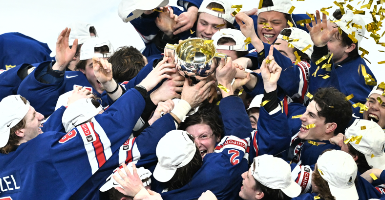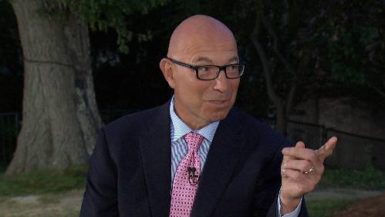 It’s only happened twice in my ten years as a golf writer: when the mail came to my law office, a golf book arrived and I dropped what I was doing to start reading it. The first time was Dan Jenkins’s Jenkins at the Majors. It was on my desk at 3:30 p.m. and by the time I looked up it was 11:00.
It’s only happened twice in my ten years as a golf writer: when the mail came to my law office, a golf book arrived and I dropped what I was doing to start reading it. The first time was Dan Jenkins’s Jenkins at the Majors. It was on my desk at 3:30 p.m. and by the time I looked up it was 11:00.
This time it was John Hopkins’s Fore! – like Jenkins at the Majors, a collection of the best of a lifetime’s work of a quintessential golf correspondent, only Hopkins is from the U.K. not Texas Christian.
Still the similarities between the two men are striking. Both have captivated generations (yes, plural) of golfers with their wit and wisdom. Both are polestars by which all other sports writers set their courses. And both are PGA of America Lifetime Achievement Award winners.
But the parallels don’t end there. Dan Jenkins can be summarized by the mantra “Golf, God, and Country.” His is the voice of the everyman golfer. The same is true of Hopkins: he is a steward and champion of the game’s traditions, ethos, and values in all their purity, grace, charm, and stoic dignity. “He’s a golfer’s golf writer and a Great Friend of the Game,” said one U.K. colleague. “He’s required reading for golf lovers.”
Take, for example, his tireless support of amateur golf tournaments such as the President’s Putter Cup, a match play event played over what Hopkins called a, “doughty links in the worst weather of any golfing event in the world,” (January, of all times!). “With any luck it takes place in conditions when many would think twice about putting out the dog.”
“We don’t play in this shit in America!” howled one Florida businessman I know when he groused to me about the weather at the Bushmills Open in Northern Ireland one June. That’s nothing compared to East Sussex in January. Still, ardent golfers know that amateurs are still the beating, buoyant heart of the game, and they understand that Hopkins was right when he wrote that President’s Putter players, golfing in January sleet near the Arctic Circle, understand that, “it’s not the winning that matters, but the taking part” and that the grateful victors acknowledge that they are not winners, but “first among equals.”
We Americans should learn from that ethos. We spend too much time “savaging second place,” dissecting minutiae, and assigning blame. Careers can be destroyed when we insist on hanging goat horns on people. At the end of the day, it’s just a game. There’s another one next week.
Indeed, the human side of the game that makes Hopkins stand head and shoulders above most of his peers. He knows that it’s not enough to just write about golf, you also have to tell the stories of the interesting people who play golf. There’s a touching piece about the outpouring of love to the Stewart family after the tragic death of Payne, calling it, “the caring side of a caring game.” There’s a poignant piece about how the experience of veteran Lee Westwood allowed him to run mind-game circles around relative newbie wunderkind Rory McIlroy, and turn that into a huge win on the scoreboard. And there’s his love of the simple pleasures in golf and life, like a “lip-smacking piece of fish” in New Orleans, a “run on the [sandy] beaches of Jacksonville,” “an $80 room at the Camelback Inn” in Scottsdale, “a coffee, a copy of the latest New Yorker, and a shoe-shine,” before a trans-Atlantic flight, or even just some Fig Newtons.
A U.K. guy likes Fig Newtons! Who’da thunk??!!
As such, he writes stories as warm and comfortable as a cable knit sweater on a cold day at Royal Dornoch.
Hopkins is great with the game story too. His Open Championship pieces are among the finest work of his career, especially the stories of Tom Watson and Jean Van de Velde, one of whom doesn’t deserved to the savaged for finishing second, the other who, rightfully, is a punch line forever. (“Jean of Argh” as Dan Jenkins called him….Then he added something to the effect of “Only a Mickey Mouse course like this [Carnoustie] could produce such a Goofy winner.”)
Hopkins agrees with Jenkins there too. He wrote that when you set up a course too tough, you increase the likelihood of a weird champion. “Distort a golf course,” he wrote, “and there is a real possibility of a fluke winner.” He then went on to praise the PGA Championship, “where the combination of excellent courses set up to reward attacking golf and the world’s best players is a bit like paraffin and matches. Good golf and drama are practically guaranteed.”
There’s even some unintentional humor. Hopkins included in the photos section what could be the most unflattering picture of Annika Sorenstam ever published. Arms raised in celebration of her singles triumph in the 2003 Solheim Cup, Annika looks less cute Swedish golfer and more Helga the East German weightlifter. Hips, waist, thighs, and biceps bulging, the only thing missing is the Viking hat with horns and the aria as the opera ends. New pic for the paperback edition, please!
Still, that’s a Swedish massage compared to the rough treatment he – thankfully – heaps on Tiger Woods in the form of refreshing, simple, yet relentless honesty.
First, Hopkins all but predicted Tiger’s fall from grace before it happened. In the April 2, 2009 edition of The Times, with Tiger as the height of his power, and only four major wins from tying Jack’s record, Hopkins unequivocally wrote that Tiger would not break Jack’s record. “Say he attracts another injury….say he is injured in a car accident as Ben Hogan was…what then?”
He then quoted no less a personage than Jack Nicklaus, who just said the words that many print journalists were thinking:
“You guys are all so willing to hand it to Tiger…like it’s already over…but doesn’t he actually have to do it first?”
Hopkins was one of the few who kept his head while most everyone else drank the Tiger Kool-Aid, and jumped on the bandwagon of the money-fueled record chase. (Gotta cash in while you can! That’s also the American Way…) Now he looks like a prophet, the only one around, in fact. Perhaps you can add – wait for it – Dan Jenkins, because he also said the only things that could stop Tiger Woods were an injury or a woman.
Then there is what I call the “Appalling Apology,” where only weeks removed from revelations about porn stars, pancake waitresses, hookers and SEX! SEX! SEX!, while Woods was delivering his February 2010 mea culpa to the world, (in a scripted speech, with no opportunity for any media to ask a single question), there was “Woods being Woods, he could not resist a flash of anger. There was even a hint of finger-wagging,” Hopkins wrote when Woods haughtily chastised the media over allegations of performance enhancing drugs and for getting too close to his members of his family. “These comments jarred, coming in the midst of an apology.”
Hopkins then summed up the whole pathetic hoedown with a hearty “Pass the sick bag, Alice” and a poignant “Let him go away and prove he can do what he said he repeatedly said he wanted to do and then we will judge him.”
That’s the great thing about British journalists – their unfailing ability to tell the truth. Hopkins once said, “Journalism is the first draft of history.” It’s refreshing to know some still see their job so altruistically, in an age where most broadcasters fall all over themselves to heap hagiographic hero worship upon any pro athlete, even those as execrable as a werewolf. In America we must constantly ask our journalists and broadcasters one important question: “What are they trying to sell me? With Hopkins, he has no guile, no ulterior motive. He’s not beholden to anyone or anything except the reader and the game. He merely holds up the mirror so we can see the reflection of what happened.
I have a sure-fire, never-fail cure for writer’s block: write the truest sentence you know. Hopkins does that with every line he writes. In an age where some people judge the quality of writing by the number of times the author calls someone a “douchebag” or uses the F-word, and editors trade girls in bikinis for commentary, Hopkins is a throwback to the grace Old World charm of Bernard Darwin, and both golf and the craft sports writing are far better for it.





